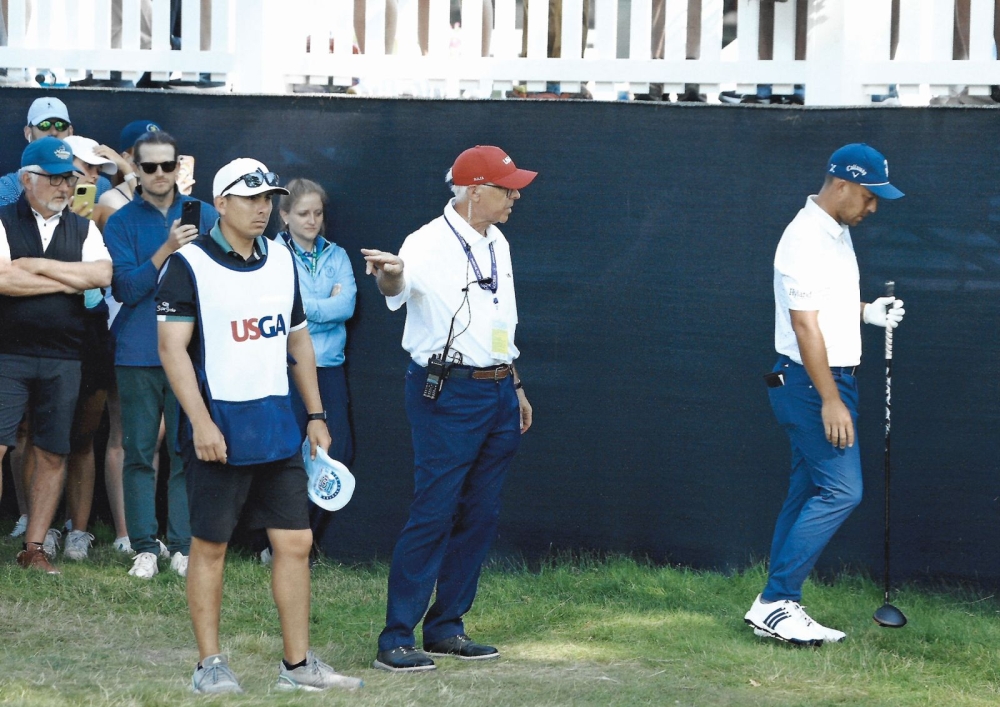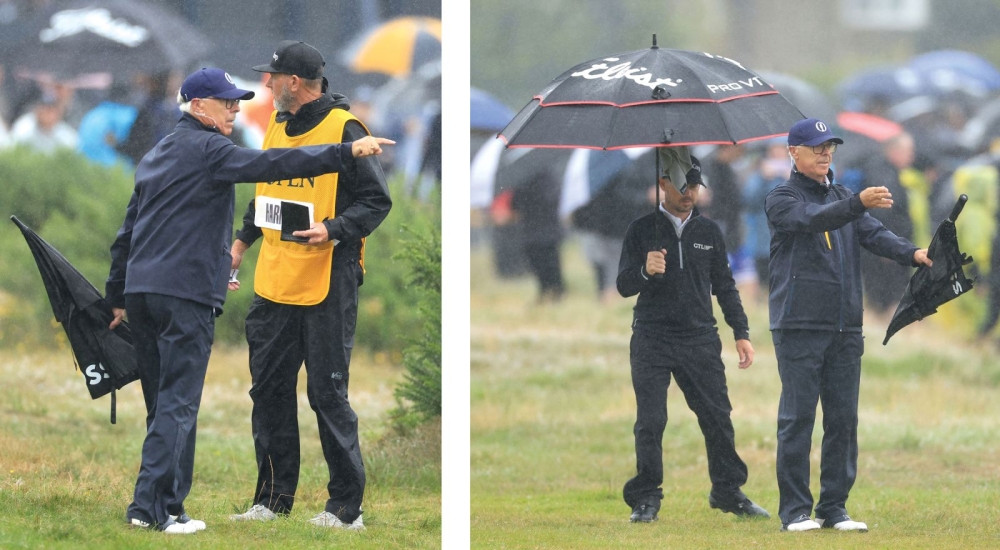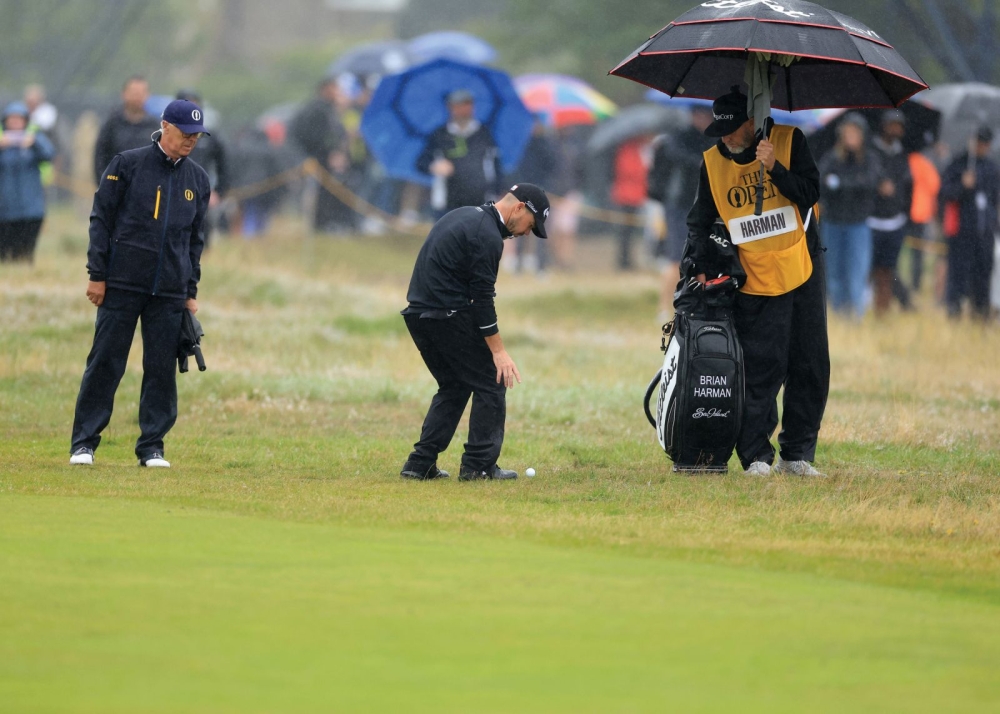A chance encounter in 2011 at Portmarnock with Gavin Caldwell, a great man of Irish golf and now a past R&A captain. Gavin had been involved for many years with R&A Championships and, having discovered that I was able to work flexibly and could maybe devote the necessary time, he put my name forward - unknown to me! - and I received a phone call out of the blue, inviting me to attend a Rules training course.
No, I certainly did not! I struggled but, with a lot of encouragement and help from The R&A Rules staff, I made it across the line.
I began refereeing at county events in 2012 and my first R&A assignment was the Boys Amateur Championship at Hoylake in 2013. I don’t think I gave any wrong rulings that week, but I do remember being told off by a spectator for my hopeless pronunciation of a French competitor’s name in the quarter finals when I was announcing the score.

September 2013 and I found it daunting but absolutely fascinating. The Committee comprises Rules professionals and highly experienced amateur officials from around the world. I served two terms, from 2013 to 2017, and then from 2019 to 2023, the latter as Chairman.
There are only three meetings per year but each one takes place over a two day period and, as you would imagine, there’s a lot of reading and preparation to do beforehand. My second term included an additional three meetings per year with the USGA, which occur immediately before or after major events, when most of the people involved are already gathered together. I refereed for about twelve weeks per year and also taught the practical application of the Rules and refereeing techniques to newly qualified officials for perhaps another two or three. The teaching has taken me as far afield as Vietnam and Chile, which were wonderful experiences and very rewarding.
I began in early 2013 at Seniors Tour Qualifying events in Portugal, which were busy and fun. I also went to Turkey with the Challenge Tour. All great learning experiences but referees never stop learning, no matter how qualified or experienced we become. There are always unusual or challenging circumstances to deal with.
Yes, always, but not to the extent that I can’t function. A few nerves and a bit of adrenaline help you to focus. Too much of either is bad! Experience helps of course. They say there are two types of referee, ones that have made mistakes and ones that are about to. We all fear being distracted and giving a wrong ruling. but we have colleagues to support us and our radios, which are a referee’s best friend.
It is, but refereeing is very much a team effort. We all rely on each other’s knowledge and support. The very best referees are the ones that are always asking each other for advice and for confirmation, sometimes for seemingly straightforward stuff. Nothing is easy in front of TV cameras, a big crowd and an anxious player.

That’s a good question. Rules knowledge is essential but that doesn’t only mean knowing exactly what the book says. Proper knowledge is being able to recognise situations for what they really are and then being able to apply the Rules appropriately. The Chief Referee of the DP World Tour always used to tell us at training sessions that every decision you make has consequences. A ruling you give to a 14-year-old player in a junior competition that results in them not qualifying for the next stage of a tournament or not being picked in the county team. A ruling at a Tour School event which leaves someone losing their playing rights for the following year. A ruling in the final round of The Open or Masters. Each will have an impact and every player at every level deserves our best attention.
I think empathy is very important, understanding the pressure that the player is under. They are in trouble and looking for help, so they certainly don’t want someone quoting a Rule number at them. They will probably not remember exactly what you say during the ruling but they will most certainly remember how you said it. I would add that a good referee needs to be brave. It would be far easier for us to sit in our golf carts and not react to something we see and are maybe unsure of, but our duty to ALL the players taking part requires us to step forward and do our best.

Oh absolutely! It’s exhilarating, particularly if you are accompanying the players, as we do at Open Championships and the later stages of the AIG Women’s Open. I’ve been fortunate to walk a full round with many of the world’s best players and it is an immense privilege. Seeing them at work ‘up close’ is fascinating. Having said that, we are not spectating. They are ‘at the office’ and so are we.
Well, all referees have their ‘war stories’ and we all look back and reflect on situations where we could have handled things better, but I’ve been lucky to avoid any great ruling disasters – so far! That’s not to say I haven’t had other issues on the course. I remember disconnecting an advertising board from its anchor points to prevent it interfering with the player’s swing on a very windy day at an Irish Open. I was holding the board when a powerful gust picked me up off the ground, rather like a sailboard, and I landed in a heap on top of Rafa Cabrera Bello’s ball. He wasn’t impressed with my efforts to help.
On another occasion, I was driving my buggy down the edge of a fairway back towards the tee in a rainstorm during a play suspension and ended up in a bunker that was landscaped into the slope. That was the last time I drove the wrong way down any fairway! It was everyone’s favourite story that season until a colleague drove off a narrow bridge and into a lake at a tournament in China, which sort of let me off the hook.
Referees never stop learning, no matter how qualified or experienced we become.
I’ve been part of the Rules team at nine Open Championships, two U.S. Opens, two Masters Tournaments and four AIG Women’s Opens. I can probably add about fifteen DP World Tour events to that total, including two BMW PGA Championships at Wentworth, which are special. My amateur golf refereeing has included two Walker Cups, a Curtis Cup, an Amateur Championship and each of the Boys, Girls and Seniors Amateur Championships. All of them have been fascinating and wonderful in their own way.
That is very difficult. For the last three years, I’ve refereed the final matches at The Open and Women’s Open, walking in with four winners – Collin Morikawa, Brian Harman, Ashley Buhai and Lilia Vu. They were all fantastic experiences. The 2023 Masters and the 2023 U.S. Open at LA Country Club were also truly memorable. However, the 150th Open at St Andrews in 2022 I think stands out as the greatest Championship I’ve seen at close quarters. I was with Rory McIlroy and Victor Hovland on both Saturday and Sunday. The standard of play, the massive crowds, the level of excitement, the setting of the Old Course – they all combined to produce a Championship that those lucky enough to be present will never forget. As Chairman of the Rules of Golf Committee at a St. Andrews Open, I also had the great privilege of being invited to the Champions Dinner, a truly memorable occasion. My two Hoylake Opens would come a very close second. Walking down the 72nd hole as the referee with the final game of an Open at your home Club is a unique privilege.
Retirement! Well, perhaps not fully quite yet. I have one more year as a referee with The R&A Panel and I remain qualified for a further three years. I hope to do the occasional amateur event and perhaps help out at regional qualifiers next summer. I enjoy teaching the Rules and would like to continue with that in some form and maybe help mentor new referees in some way.
Undoubtedly it is the fascinating and lovely people I have encountered, particularly those I have worked closely with for so long. Whenever possible, my wife Mags has travelled with me and we have represented The R&A together at major Championships in the UK and USA. She has been a fantastic help and my greatest supporter throughout all this last decade. I couldn’t have done it without her. She has also made many great friends along the way. All good things come to an end. We have been so very lucky and privileged to see, learn and enjoy so much.
I doubt it! Though Just managing a half with you every now and again would be nice.